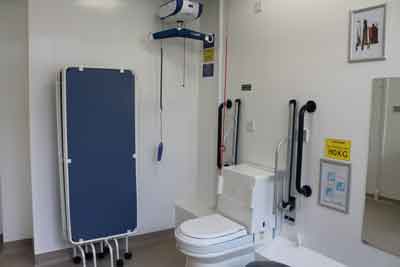Disability Pay Gap Widens
Disabled workers earn £2,730 a year less on average than non-disabled workers says a new TUC report meaning the disability pay gap has increased to its highest...
Read Full Article
A new report claims that UK hospitals and clinics are putting disabled people and their carers at risk by not providing appropriate toilets.
The toilet access report – Making a Case for Fully Accessible Toilets Within the NHS – states toilets in NHS buildings have been found that are unsafe and that fail to ensure the dignity, safety and wellbeing of patients, staff and carers.
Further, of the 206 acute and mental health NHS Trusts, only 42 have a basic changing places assisted accessible toilet for people who need a carer’s help.
The most common safety failings include:
Some toilets have been found to be unsafe, e.g. by not using non-slip flooring, no emergency cords/unreachable cords or not having the right type and placement of support rails.
Hospitals are failing to ensure dignity, safety and well being of patients, staff and carers by offering unsuitable alternatives to standard toilets.
There are 155 acute NHS trusts plus 56 mental health trusts as of October 2015. Many having multiple buildings across several locations. Out of all these buildings, only 42 provide a basic changing places toilet with hoist, extra space and bench access.
NHS staff, for the safety of themselves and patients, cannot assist by lifting people from wheelchair to toilet or from a seated to standing position. Where changing places are not provided or other suitable equipment such as adjustable height toilets, patients must take a family member to do manual lifting/assisting. This has caused long term back pain for many carers and is painful and dangerous for those being lifted.
Other areas that were criticised in the report included poor signposting and general health and wellbeing, e.g. where a healthy adult empties their bladder every 2-3 hours, yet many disabled patients are avoiding food and liquids for several hours because they know they cannot use toilets at hospitals and clinics.
One specialist provider of hospital toilets has expressed concern at the report’s findings and has published its own findings. “Research shows some 30% of NHS users in the UK are disabled, and hospitals are the second most inaccessible buildings for them,” explained Kelvin Grimes, Project Manager, Changing Places, Clos-o-Mat. “Legally, any service provider has to make ‘reasonable adjustments’ to the built environment that would put someone at a substantial disadvantage, and those adjustments should be made in anticipation of a need being demonstrated. Those adjustments include suitable toilet provision. Provision of toilets is a basic human right under the European Convention of Human Rights, yet is, according to the toilet access report, the most overlooked human right.”
Picture: The hospital report on disabled toilets has found many areas of basic design, sanitary conditions and safety are not being followed but our picture shows a Clos-o-Mat toilet which does conform to strict guidance
Article written by Mike Gannon | Published 03 March 2016
Disabled workers earn £2,730 a year less on average than non-disabled workers says a new TUC report meaning the disability pay gap has increased to its highest...
Read Full ArticleBSI, the business standards company, has revised BS 8300:2018 Design of an Accessible and Inclusive Built Environment. The revised standard aims to give clients,...
Read Full ArticleThere has been a call for the richest football clubs in the English Premier league to improve accessibility following a Private Member’s Bill introduced by Lord...
Read Full ArticleThe facilities management sector is influential in acknowledging the complexity of accessibility in the workplace. But is the digital revolution making things...
Read Full ArticleNew guidance from the Equality and Human Rights Commission means that companies must provide reasonable workplace adjustments if menopause symptoms have a substantial...
Read Full ArticleParalympian Ellie Challis and her father were unable to access their Premier Inn hotel room due to a broken lift. As reported by the BBC, Ellie Challis, a Paralympic...
Read Full ArticleA major £700m upgrade to the ticket hall at Bank Underground station now provides step-free access to the Northern line for the first time. Watch the...
Read Full ArticleEMCOR UK has achieved “employer” status through the government’s Disability Confident scheme. The scheme has three defined levels, and Disability...
Read Full ArticleJuly marks Disability Pride Month, an international event that shines a light on physical, learning, hidden disabilities and mental health conditions, enabling open...
Read Full ArticleThe business case for a more accessible travel experience is clear – but how can built environment professionals make public spaces such as airports less stressful...
Read Full Article